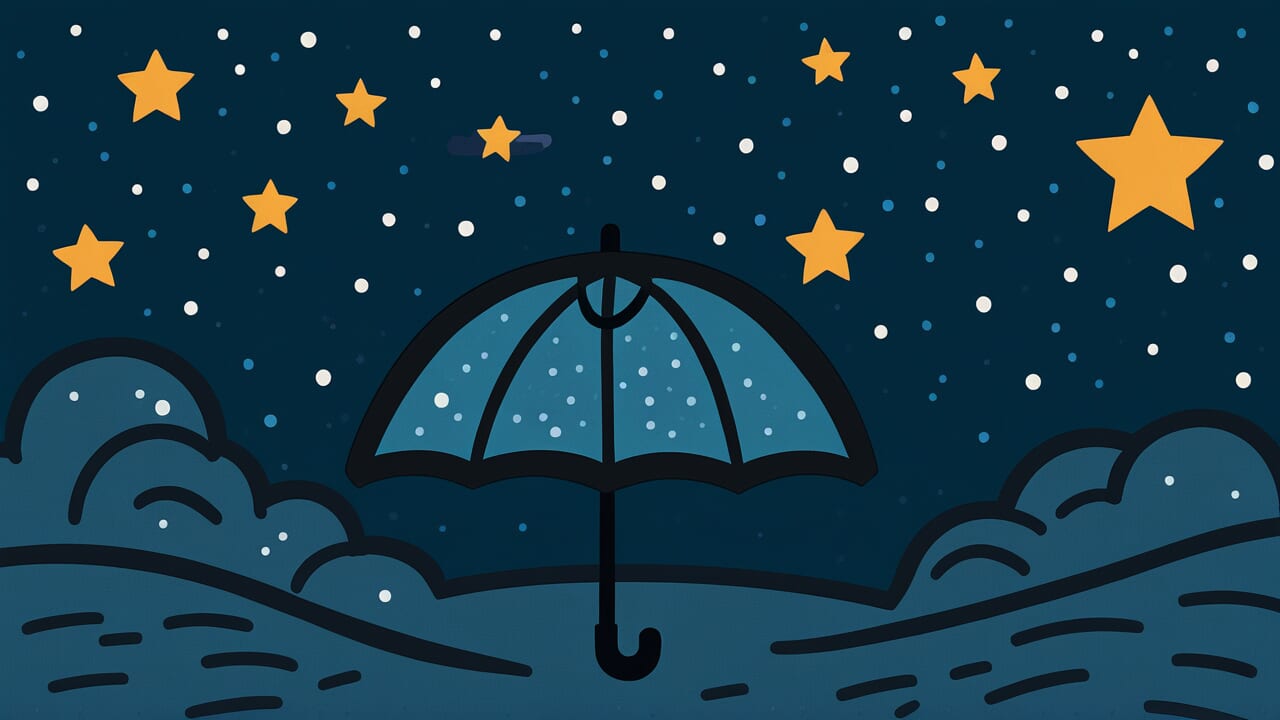How to Read “Stars even on a rainy night”
Ame no yoru ni mo hoshi
Meaning of “Stars even on a rainy night”
“Stars even on a rainy night” means that things we normally think are impossible can sometimes happen, even if rarely.
This proverb expresses the reality that exceptional events can occur even in situations that seem impossible by common sense.
People use it when they experience unexpected good fortune or when something they had given up on actually comes true.
It also serves as a warning against deciding that something is “absolutely impossible.”
You normally cannot see stars on a rainy night. But rarely, stars appear through breaks in the clouds or right after the rain stops.
Using this natural phenomenon as a metaphor, the proverb teaches that “one-in-a-million” possibilities can become reality in life too.
Even today, people use this expression when low-probability events happen, like winning the lottery or passing a difficult exam.
Origin and Etymology
No clear written records of this proverb’s origin seem to exist. However, we can make interesting observations from how the phrase is constructed.
Stars should never be visible on a rainy night. This is a natural law everyone knows.
Rain clouds cover the sky, so starlight cannot reach the ground. The wisdom of our ancestors shines through in expressing this seemingly physically impossible situation as a proverb.
Japan has long had a culture of observing celestial bodies. Stars were deeply connected to people’s lives.
They served as markers for knowing when to do farm work and as guides for sea navigation. Stars were crucial to daily life.
A rainy night when stars could not be seen was truly a symbol of an “impossible situation.”
However, stars actually do peek out for a moment through breaks in clouds when rain stops.
Or stars might begin to shine in the sky where raindrops still remain, right after a sudden shower passes.
People who witnessed such rare natural phenomena probably captured the life truth that “things we thought impossible sometimes do happen” in this beautiful expression.
Usage Examples
- Winning a contest I entered on a whim is truly stars even on a rainy night
- I never thought he would apologize, but I guess stars even on a rainy night can happen
Universal Wisdom
The proverb “Stars even on a rainy night” contains deep insight into two contradictory human tendencies.
First is our tendency to judge things based on experience and decide “this is absolutely impossible.”
Learning from past experience is a necessary survival skill. But at the same time, it becomes a cage that narrows possibilities.
Stars cannot possibly be seen on a rainy night. This common-sense judgment is correct most of the time.
However, another truth exists: the world has complexity beyond our predictions.
Even if the probability is low, it is not zero. This recognition has continued to give hope to humanity.
Our ancestors must have realized this truth while observing rare phenomena in nature.
This proverb has been passed down for so long because it is wisdom based on reality, not mere optimism.
Stars actually can be seen on rainy nights. That is why we can convincingly say that things that seem “impossible” can happen in life too.
Humans cannot live without hope. But hope without foundation is fragile.
This proverb gives us hope accompanied by a reliable witness: nature itself.
When AI Hears This
This proverb conveys the conviction that “stars exist even when invisible.” But quantum mechanics’ observation problem shakes this premise at its foundation.
In the quantum world, an electron is not determined to be “here” or “there” until observed.
This is called a superposition state. In other words, an unobserved electron is not “existing but invisible.”
Rather, “multiple states exist simultaneously.” Only through the act of observation does it settle into one state.
An interesting problem emerges when we apply this to stars hidden by rain clouds.
We believe “stars definitely exist beyond the rain clouds.” But if quantum mechanics principles apply to the macroscopic world too, unobservable stars might be in a superposition of “existing” and “not existing.”
In fact, the famous thought experiment called Schrödinger’s cat raised exactly this problem.
This proverb can speak of hope because of the classical physics worldview that an object’s state is determined even without observation.
But quantum mechanics teaches that unobserved reality is not determined.
In other words, the basis for asserting that invisible hope “exists there” is actually scientifically shaky.
Perhaps hope is an active creation that becomes real only through the act of observation.
Lessons for Today
This proverb teaches modern people the importance of not completely closing off possibilities.
We face various decisions every day. Should we take on a new challenge or give up? Should we trust someone or doubt them?
At such times, past experience and statistical data become important judgment materials.
However, if we eliminate possibilities from the start by thinking “it’s impossible anyway,” we miss chances that might actually come.
What matters is the balance between being realistic and staying open to possibilities.
Stars are rarely visible on rainy nights. But that does not mean we need to stop looking up at the sky.
Do not expect too much, but do not give up completely either. This delicate sense of balance enriches life.
If you are thinking right now “this is probably impossible,” try opening your heart just a little.
By taking action, the probability rises from zero even slightly.
Just as stars can be seen even on rainy nights, unexpected brightness may visit your life too.



Comments